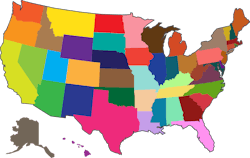NIH study offers evidence of early SARS-CoV-2 infections in the U.S.
A new antibody testing study examining samples originally collected through the National Institutes of Health's All of Us Research Program found evidence of SARS-CoV-2 infections in five states earlier than had initially been reported. These findings were published in the journal Clinical Infectious Diseases.
The results expand on findings from a Centers for Disease Control and Prevention (CDC) study that suggested SARS-CoV-2, the virus that causes COVID-19, was present in the U.S. as far back as December 2019.
In the All of Us study, researchers analyzed more than 24,000 stored blood samples contributed by program participants across all 50 states between January 2 and March 18, 2020. Researchers detected antibodies against SARS-CoV-2 using two different serology tests in nine participants' samples. These participants were from outside the major urban hotspots of Seattle and New York City, believed to be key points of entry of the virus in the U.S. The positive samples came as early as January 7 from participants in Illinois, Massachusetts, Mississippi, Pennsylvania and Wisconsin. Most positive samples were collected prior to the first reported cases in those states, demonstrating the importance of expanding testing as quickly as possible in an epidemic setting.
"This study allows us to uncover more information about the beginning of the U.S. epidemic and highlights the real-world value of longitudinal research in understanding dynamics of emerging diseases like COVID-19," said Josh Denny, MD, MS, Chief Executive Officer of All of Us and an author of the study. "Our participants come from diverse communities across the U.S. and give generously of themselves to drive a wide range of biomedical discoveries, which are vital for informing public health strategies and preparedness."
In studies like these, false positives are a concern, particularly when the prevalence of viral infections is low, as was the case in the early days of the U.S. epidemic. Researchers in this study followed CDC guidance to use sequential testing on two separate platforms to minimize false positive results.
All of Us worked with Quest Diagnostics to test samples on the Abbott Architect SARS-CoV-2 IgG ELISA and the EUROIMMUN SARS-CoV-2 ELISA (IgG) platforms. For a sample to be considered "positive" by the research team, it had to have positive results on both platforms, which target antibodies that bind to different parts of the virus. Both tests have emergency use authorization from the FDA.
The study authors noted several limitations to their study. While the study included samples from across the U.S., the number of samples from many states was low. In addition, the authors do not know whether the participants with positive samples became infected during travel or while in their own communities. Ideally, this study could be replicated in other populations with samples collected in the initial months of the U.S. epidemic and with multiple testing platforms to compare results.
All of Us expects to release more information following further analysis, and will offer participants whose samples were included in the study an opportunity to receive their individual results. The presence of antibodies in one's blood sample does not guarantee that a person is protected from the infection (has immunity), or that any such protection will last.

